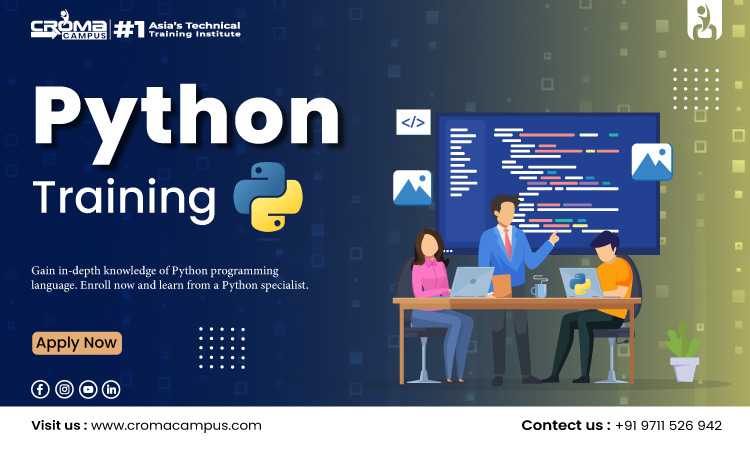To begin with, Python is a computer programming language often used to build websites and software. Along with this, it also helps in automating the tasks and analyzing the data. This is a general-purpose language, which is not specialized for any specific problems and can be used to create various programs.
Use Cases of Python
These are just a few examples of the many ways Python can be used. Its versatility and extensive library ecosystem make it a valuable tool for developers and researchers across various fields. Python’s versatility and readability have made it a popular choice for a wide range of applications. Many institutes provide Advanced Python Programming Course and enrolling in them can help you start a career in this domain. Here are some common use cases of Python.
· Backend Development- This language is useful for building server-side logic and APIs for web applications using frameworks like Django, Flask, or FastAPI.
· Full-Stack Development- Python is useful for full-stack development and it helps in developing both the front-end and back-end components of web applications.
· Data Analysis and Visualization- Its libraries like Pandas, NumPy, and Matplotlib are useful for data exploration and visualization.
· Machine Learning Models- Python helps in building and training machine learning models using frameworks like TensorFlow, Keras, or PyTorch.
· Natural Language Processing- This language is useful for processing and analyzing text data for tasks like sentiment analysis, text classification, and machine translation.
· Scientific Computing and Research- This language provides physical phenomena, such as fluid dynamics or particle physics.
· Integrating with Game Engines- It is capable of integrating Python with game engines like Unity or Unreal Engine.
· Web Scraping- Python Is useful for extracting data from websites and also for analyzing biological data, such as DNA sequences.
Career Opportunities in Python
Python offers great versatility and readability which makes it a popular choice for a wide range of applications. There are numerous ways by which Python can be used. Along with this, it provides great versatility and comes with an extensive library ecosystem. Thus, making it a valuable tool for developers and researchers across various fields. Along with this, the demand for Python developers is high across various industries. Thus, making it a lucrative career path for those with skills and experience. To further know about it, one can visit the Python Classes in Delhi. Here are some of the high-paying careers you can explore after learning Python.
· Data Scientist- These professionals have to analyze and interpret large datasets to extract valuable insights.
· Machine Learning Engineer- Their primary job is to develop and deploy machine learning models for various applications.
· Data Analyst- These professionals work on using Python for data cleaning, preparation, and analysis.
· Backend Developer- They have to build the server-side logic and APIs for web applications.
· Full-Stack Developer- These professionals work on both front-end and back-end development using Python frameworks.
· DevOps Engineer- As a DevOps engineer, you will be responsible for automating the infrastructure management.
· System Administrator- These professionals have to use Python for scripting and automating system tasks.
· Researcher- As a researcher, you will have to analyze scientific data and conduct simulations using Python.
· Data Analyst- These professionals work in fields like finance, healthcare, or academia to analyze data and extract insights.
What is Taught in the Python Course?
Here are the important topics you will learn after enrolling in the Python course.
Fundamentals
· Overview of Python’s history, features, and applications.
· Variables, data types, operators, control flow (if-else statements, loops).
· Defining and using functions to organize code.
· Importing and using modules and packages.
Data Structures
· Lists: Creating, manipulating, and using lists.
· Tuples: Understanding tuples and their immutability.
· Dictionaries: Working with key-value pairs in dictionaries.
· Sets: Using sets for unique elements and set operations.
Object-Oriented Programming (OOP)
· Classes and Objects: Creating classes and objects in Python.
· Inheritance: Understanding inheritance and polymorphism.
· Encapsulation: Encapsulating data and methods within classes.
File I/O
· Reading and Writing Files: Working with text and binary files.
· File Handling: Using file objects and methods.
Libraries and Frameworks
· Popular Libraries: Exploring commonly used libraries like NumPy, Pandas, Matplotlib, and Scikit-learn.
· Web Frameworks: Using frameworks like Django or Flask for web development.
Advanced Topics
· Regular Expressions
· Exception Handling
· Decorators
· Generators
· Multithreading and Multiprocessing
Conclusion
7Python’s versatility and readability have made it a popular choice for a wide range of applications. It is useful for numerous tasks ranging from web development and data science to scientific computing and automation. The demand for Python developers is high across various industries, offering lucrative career opportunities. By mastering Python, you can open doors to exciting and rewarding career paths in the tech world.
